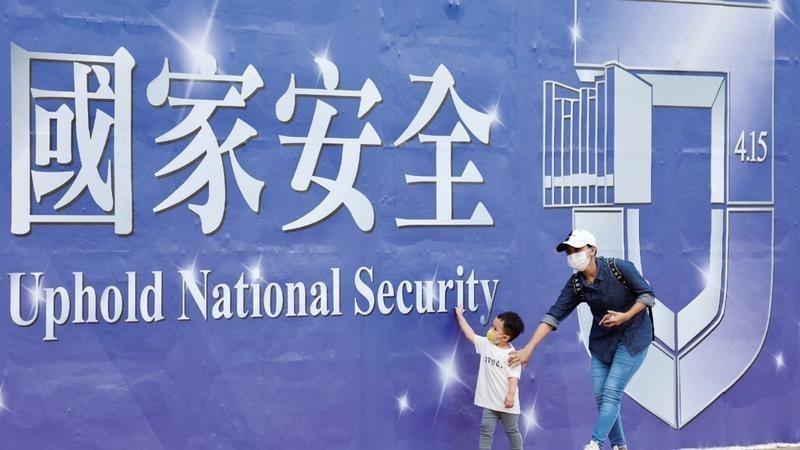 This photo dated on April 14, 2022 shows a child walking past a billboard promoting National Security Education Day in the Central district of Hong Kong. (EDMOND TANG / CHINA DAILY)
This photo dated on April 14, 2022 shows a child walking past a billboard promoting National Security Education Day in the Central district of Hong Kong. (EDMOND TANG / CHINA DAILY)
Educators in the Hong Kong Special Administrative Region warned that employing YouTube as a teaching aid poses risks to national security education, and called for better guidelines on the use of free online video platforms, as well as government subsidies to allow schools to choose professional online educational platforms.
A survey issued on Wednesday revealed that 80 percent of schools in Hong Kong lack proper guidelines and policies concerning the use of YouTube.
90 percent of schools have yet to identify the potential risks on national security education brought by YouTube’s operational model, its search engines, advertisements and recommended videos
Additionally, 90 percent of schools have yet to identify the potential risks on national security education brought by YouTube’s operational model, its search engines, advertisements and recommended videos.
READ MORE: National Security Law for Hong Kong serves the city well
The survey was conducted by the New Territories School Heads Association, in collaboration with the Hong Kong Island School Heads Association, the Kowloon Region School Heads Association, and lawmaker Lillian Kwok Ling-lai, who is also a registered teacher.
Chu King-yuen, president of the New Territories School Heads Association, pointed out that when users search for “national anthem of Hong Kong” on YouTube or Google, the results are not always the correct national anthem of China, sometimes linking to a pro-independence song advocating separating Hong Kong from the nation. Such misleading information brings grave challenges to the city’s national security education, he said.
He added that the operational model of YouTube relies on information provided by advertising clients, so schools, parents, and students have no control over the content offered by advertisers or their recommended videos.
To address the problem, lawmaker Kwok suggested that the Education Bureau establish a reporting mechanism to promptly address any inappropriate content or potential risks on YouTube that may jeopardize national security.
She also proposed fostering a stronger partnership between schools and parents to cope with the issue, by organizing lectures on YouTube’s search function, ensuring that both parents and students have access to accurate information regarding the Chinese national anthem.
Chow Lap-ming, vice principal of Fung Kai No 1 Primary School in Sheung Shui, shared his school's experience of using alternative online platforms for educational purposes. By adopting a dedicated cloud-based educational platform, the school ensures the legality and safety of uploaded content. The platform can also be used on the Chinese mainland, which also benefited a significant number of cross-border students in the school.
Chow explained that the platform also provides viewing statistics, enabling teachers to better follow up students' studies and tailor their teaching content accordingly.
READ MORE: National security risks remain as NSL enters its third year
Yau Siu-hung, chairman of the New Territories School Heads Association, appealed to the Hong Kong Special Adminstrative Region government to allocate more resources to help schools acquire services of cloud-based streaming video platforms. He said such platforms could play a crucial role in enhancing students' comprehension of national security issues.


